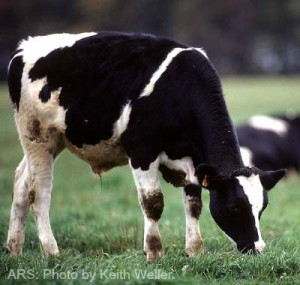The Whatcom County Health Department (WCHD) in Bellingham, Washington, has released its final report on the outbreak of Shiga toxin-producing E. coli O157:H7 infections linked to the Milk Makers Fest held between April 21 and 23, 2015. WCHD, the Washington State Department of Health and the Centers for Disease Control and Prevention (CDC) took part in the investigation.
25 People Sickened by E. coli in a Dairy Barn
 The investigation determined that the likely source of the outbreak was environmental contamination with E. coli O157:H7 of the Dairy Barn at the Northwest Washington Fairgrounds, where the Milk Makers Fest was held. E. coli bacteria can colonize in a cows intestines without making the animal sick. But contaminated cow manure can make make people sick.
The investigation determined that the likely source of the outbreak was environmental contamination with E. coli O157:H7 of the Dairy Barn at the Northwest Washington Fairgrounds, where the Milk Makers Fest was held. E. coli bacteria can colonize in a cows intestines without making the animal sick. But contaminated cow manure can make make people sick.
This is what we know about the outbreak victims:
- 25 confirmed cases, based on lab-confirmed infection with E. coli 0157:H7 or physician-diagnosed hemolytic uremic syndrome (HUS), a severe complication that causes of kidney failure.;
- 9 of them secondary cases, meaning they did not attend the event but had close contact with someone who did;
- Some of the 25 helped with the event between April 20 and 24;
- Most of the people sickened were children, who are at higher risk for developing hemolytic uremic syndrome;
- 10 people were hospitalized; and
- 6 people developed hemolytic uremic syndrome.
E. coli Found in Several Locations at Northwest Washington Fairgrounds
Investigators tested environmental samples from the Northwest Washington Fairgrounds, where the Milk Fest was held.
The samples indicated that several areas of the north end of the Dairy Barn at the Northwest Washington Fairgrounds were contaminated with the same strain of E. coli that made people ill.
The outbreak strain of E. coli O157:H7 was identified in the following areas of the Dairy Barn:
- Manure bunker
- Hay maze area
- Bleachers by east wall
- Bleachers by west wall.
Investigators believe the E. coli contamination occurred before the Milk Makers Fest.
Preliminary Findings from Interviews
The results of analyzing the data collected during the interviews are not final, but a few preliminary findings stand out:
- Event attendees who reported washing or sanitizing their hands before eating lunch were less likely to become ill.
- Children who reported always biting their nails were more likely to become ill.
- Leaving animal areas without washing hands might have contributed to an increased risk of transmission.
- Eating in animal areas might have contributed to an increased risk of transmission.
Does Your Child Need Help?
Our E. coli Lawyers have helped many children and their families get compensation for medical expenses, pain and suffering and other losses. You can click here now for a free consultation.